What Are Filters In A Camera
The Best Filter To Protect Your Camera Lens
If you're going to spend a big chunk of coin on a new lens, it's safe to assume y'all want to keep it protected and scratch-complimentary. The best way to do this is by using a lens filter. The problem is, what'southward the best filter to protect a camera lens with?
The best filter to protect a camera lens is called a UV Filter (Ultraviolet Filter). Different other lens filters, a UV filter is completely clear and has no real effect on your images. Since information technology creates a secondary barrier betwixt your front end chemical element and the outside world, it effectively protects your lens from accidental bumps or scratches.
What Is A UV Filter?
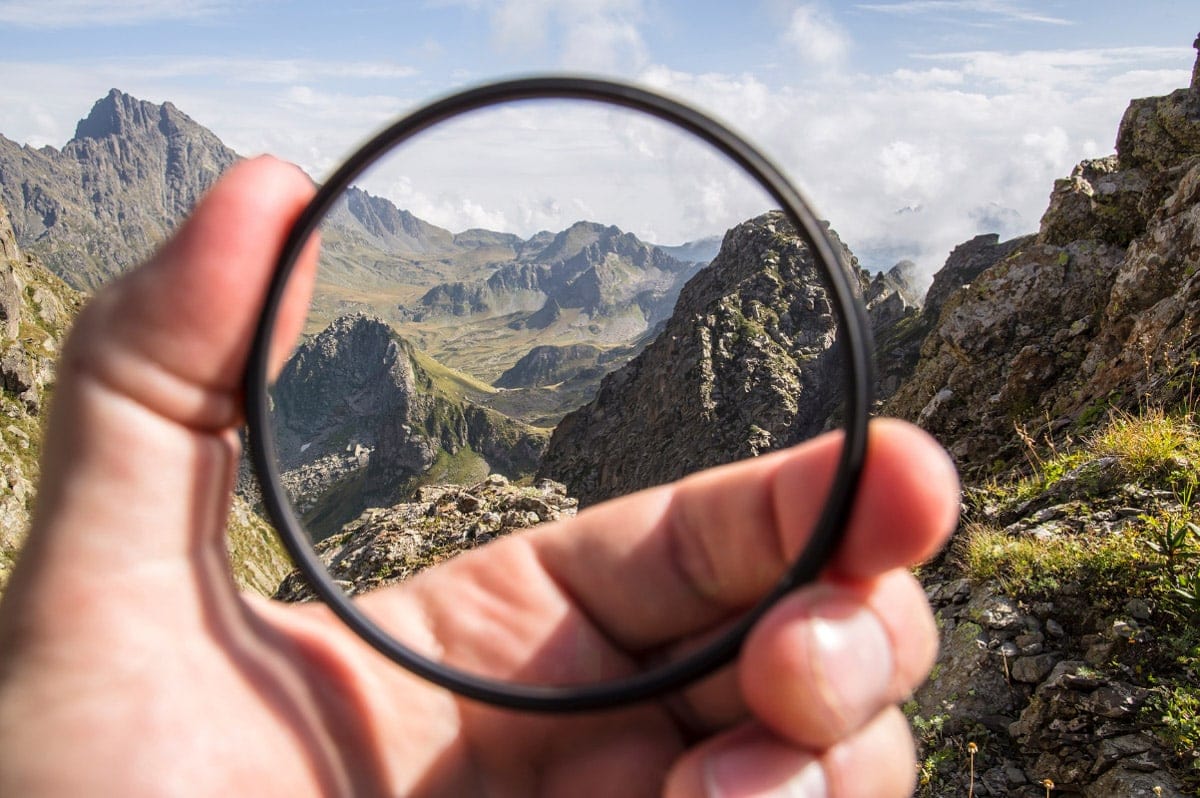
The UV filter was initially created in the motion-picture show days to protect the film from being exposed to ultraviolet lite from the sun. Especially on a sunny day, information technology was common for sure types of films to get a purply-blueish haze from the UV light. By using a UV filter, you lot could cut out this light and capture a more than natural-looking photo.
In modernistic-day, digital cameras aren't sensitive to UV light, so your photos look largely the same with or without a UV filter. They're withal around today considering they act as the perfect filter to protect your camera lens. Starting at only $10, it's not equally heartbreaking to damage a UV filter compared to your bodily lens.
Are There Side Effects To Using UV Filters?
For near situations, using a UV filter won't make whatever divergence in your images. With that said, there are a few exceptions to this rule. When you lot're shooting into direct sunlight or trying to capture a lens flare, it'due south possible to experience some double reflections, also known every bit ghosting.
A double reflection is basically when the calorie-free reflects off the inside of the filter and can cause weird calorie-free furnishings in your image. Especially with sun flares, this can ruin the crisp look of them.
However, this slight alter is and so minimal that many people wouldn't even discover if you compared two photos side by side. Information technology's purely a personal choice and whether or non an extra lite streak in your photograph bothers you or not.
For example, I shot this photograph below with a UV filter on my lens, and the sunday flare doubled itself because of a double reflection. From a technical standpoint, this isn't peachy, only does information technology ruin the entire photo? No.
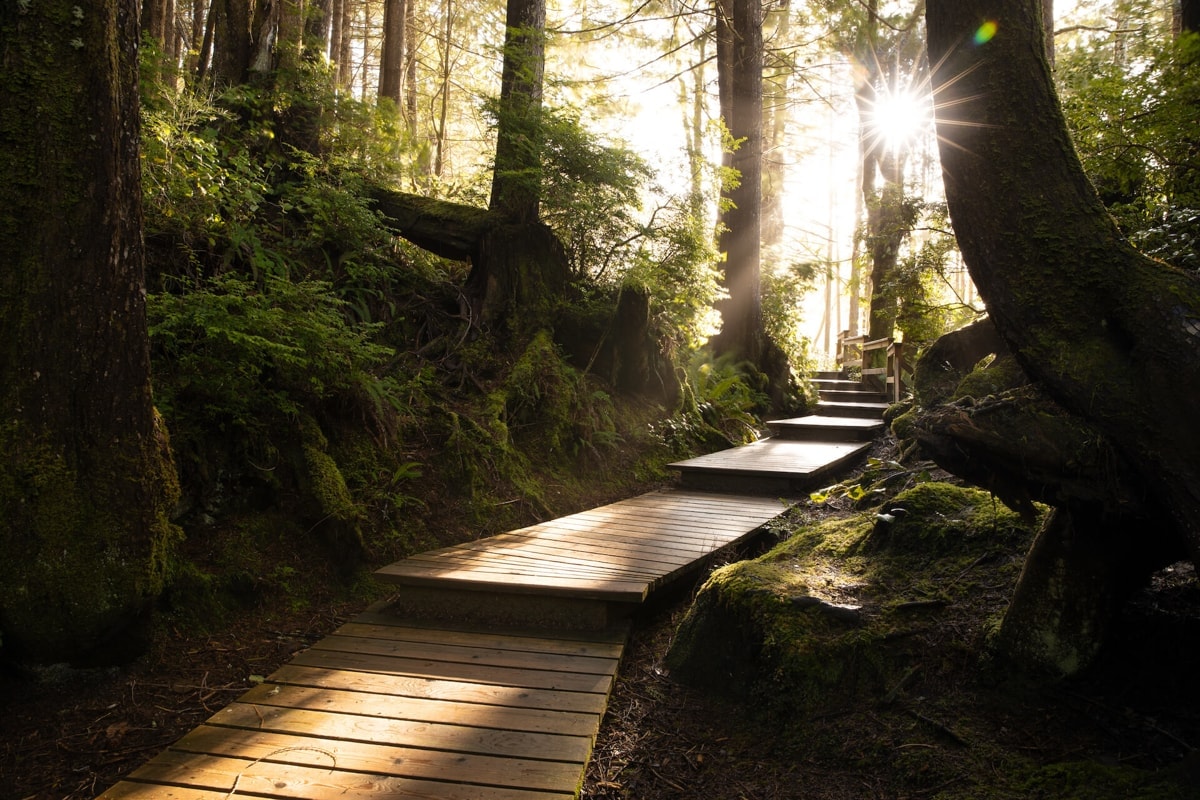
The mild side effects don't make enough of a departure to make me want to become rid of it altogether. If they truly bother you lot, these filters tin be easily screwed on and off, depending on the state of affairs.
Volition A UV Filter Protect A Camera Lens From Anything?
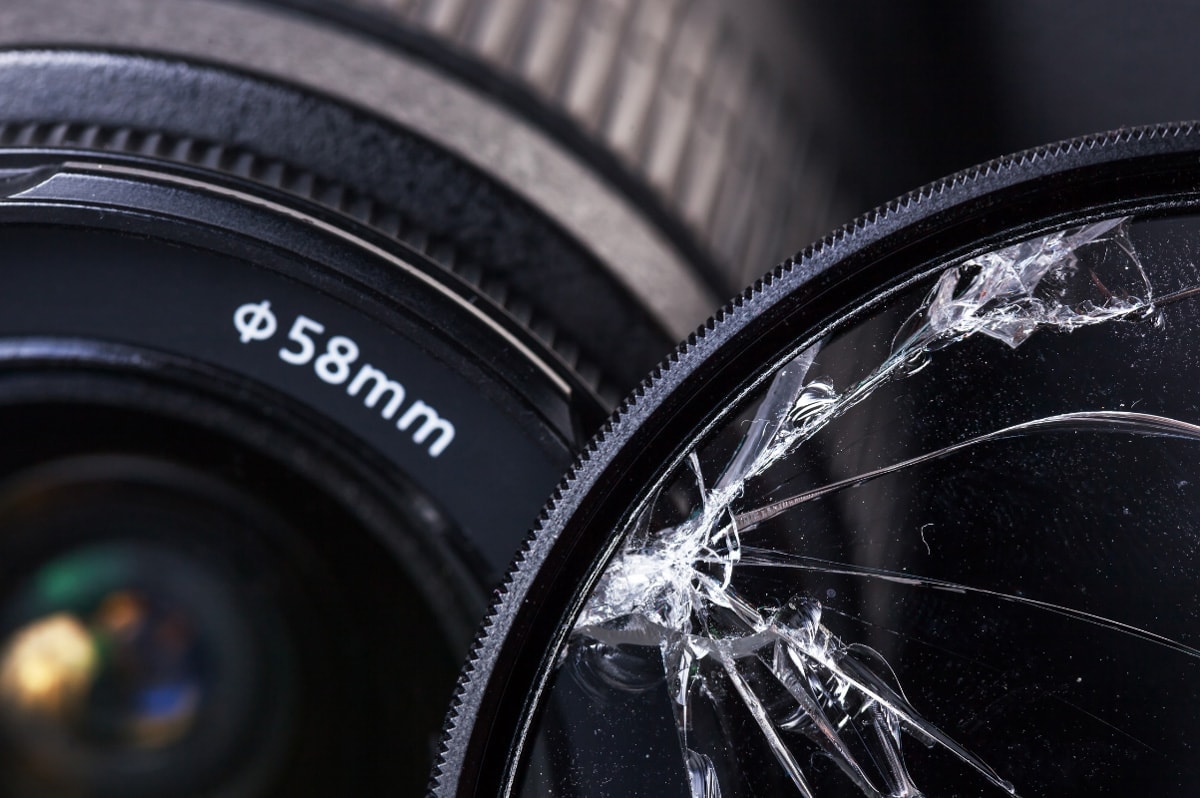
Before you start thinking the UV filter is this bulletproof filter, let'south be existent for a minute. Yes, this filter will protect your lens from bumps and scratches. Yet, information technology will non necessarily protect it from a fall or something significant hitting the lens.
To assist give you an example, allow's talk well-nigh stone climbing photography. Over the years, I've taken my camera up a lot of cliffs, and information technology's been in some precarious places. It's been bumped by gear and slammed effectually more than times than I'd like to acknowledge. Equally you tin imagine, I've gone through a few UV filters over the years. Niggling things like a stone hit the lens or a piece of gear sliding across the filter might crusade the filter to scratch, only the lens itself remains unscathed. In that sense, the UV filter has protected my camera lens in all of my experiences.
However, some people have had their camera tip over on the tripod and striking the ground lens first. With that much force and landing on a difficult surface, it's totally possible to shatter the filter. If the UV filter shatters, it's open flavor on your actual lens element. All bets are off whether or not your lens will live to tell the tale. In that sense, UV filters won't always protect your lens.
Only considering you have a UV filter to protect your camera lens doesn't mean that it all of a sudden becomes untouchable. Just like your real lens, a filter can break too. These filters are meant to protect from light bumps and scratches, but there's no guarantee they'll protect yous from anything hitting the lens with forcefulness.
The All-time UV Filters For Lens Protection
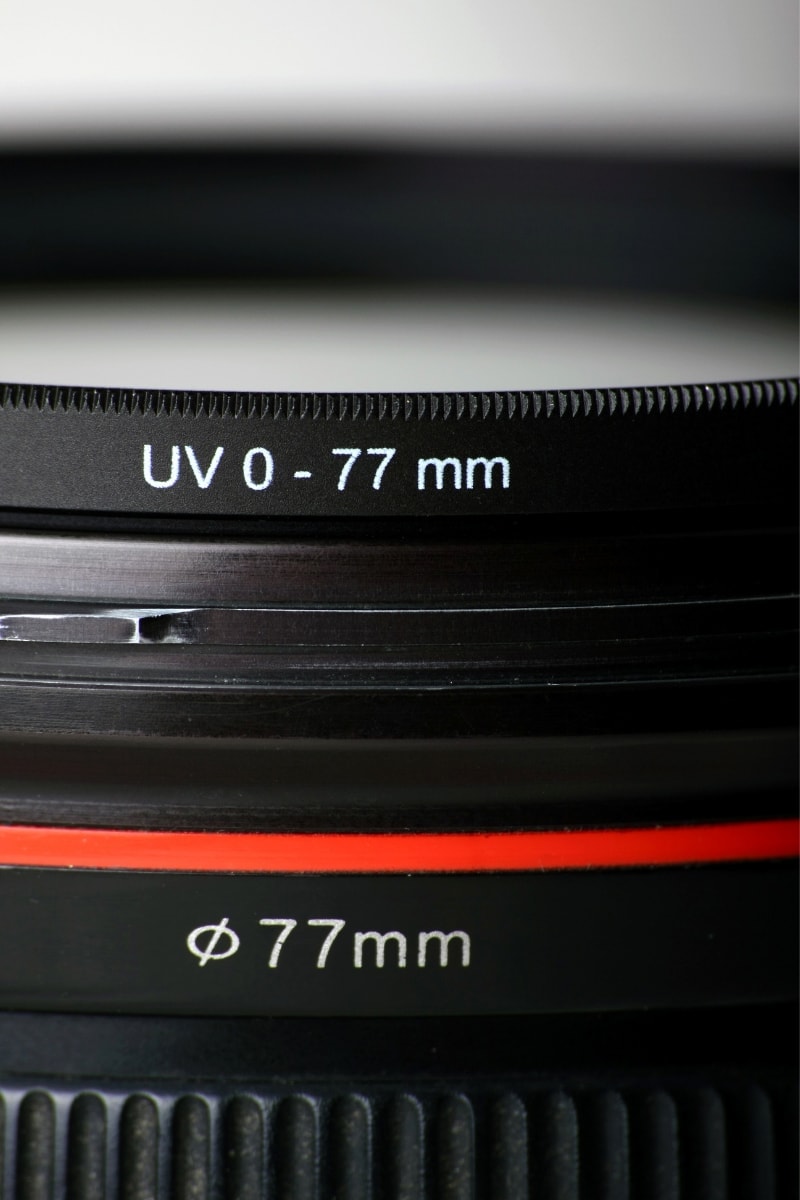
Now allow's discuss some of the best UV filters for photographers to use. I'll share some of my personal favorites from feel and other highly recommended ones. The beauty of these filters is that they're dirt cheap compared to other photography filters.
Before you purchase a lens filter, make sure that information technology's the right size for your lens. Every lens has a different thread diameter, and you can find it printed almost the forepart element of the lens. Make certain to order the correct size filter; otherwise, you'll exist in for a world of annoyance.
Agreement The Price Divergence Between UV Filters
Some UV filters will cost every bit little at $7, while others cost $150 or more. Likewise the obvious price gap, let's go over why certain UV filters are more than expensive than others.
– Quality of Coating
Most UV Filters will have some level of coating to help forestall ghosting and better light transmission. With just a regular uncoated UV filter, light tin can reflect off your lens element and rebound off of the inside of your filter. This results in ghosting or a double reflection that yous should avoid. Secondly, light can reflect off the outside of the UV filter and not really reach your camera's sensor. This results in a lower dissimilarity photograph because there is light manual loss. One of the big differences between inexpensive and expensive UV filters is the quality of this coating. Information technology decides how well the filter maintains contrast and combats ghosting.
– Nanocoating Vs. Multicoating Vs. Uncoated
Any college-cease UV filter volition be nanocoated. This is a newer grade of blanket that is designed to avoid calorie-free reflection flow. Even with the brightest light sources, you're far less likely to feel any kind of manual loss or ghosting in your photos. However, you'll pay a premium for this blazon of coating. Is it worth the money? Admittedly.
Multicoating is the step down from nanocoating. A multicoated UV filter refines low-cal to cancel out reflected light particles so that ghosting doesn't occur. This type of coating will do the job, but might not work perfectly when shooting directly into the sunlight.
Finally, a non-coated lens filter is guaranteed to accept reflections and transmission loss. With this filter fashion, you'll experience something called 'blooming', which is a soft glow effectually highlights. It can be used as an artistic touch but is not platonic for most photos. With cheaper filters, you might be buying something that's uncoated and, therefore, lower quality.
– Filter Fabric
The concluding thing that makes a big departure in the cost of UV filters is what they're actually made of. A mid-range or high-terminate UV filter will be fabricated out of optical glass, then you lot're guaranteed higher paradigm quality. Lower quality filters will be made out of plastic instead, which won't have the same prototype clarity.
Top iii UV Filter Picks
– Tiffen UV Protection Filter (Well-nigh Popular)
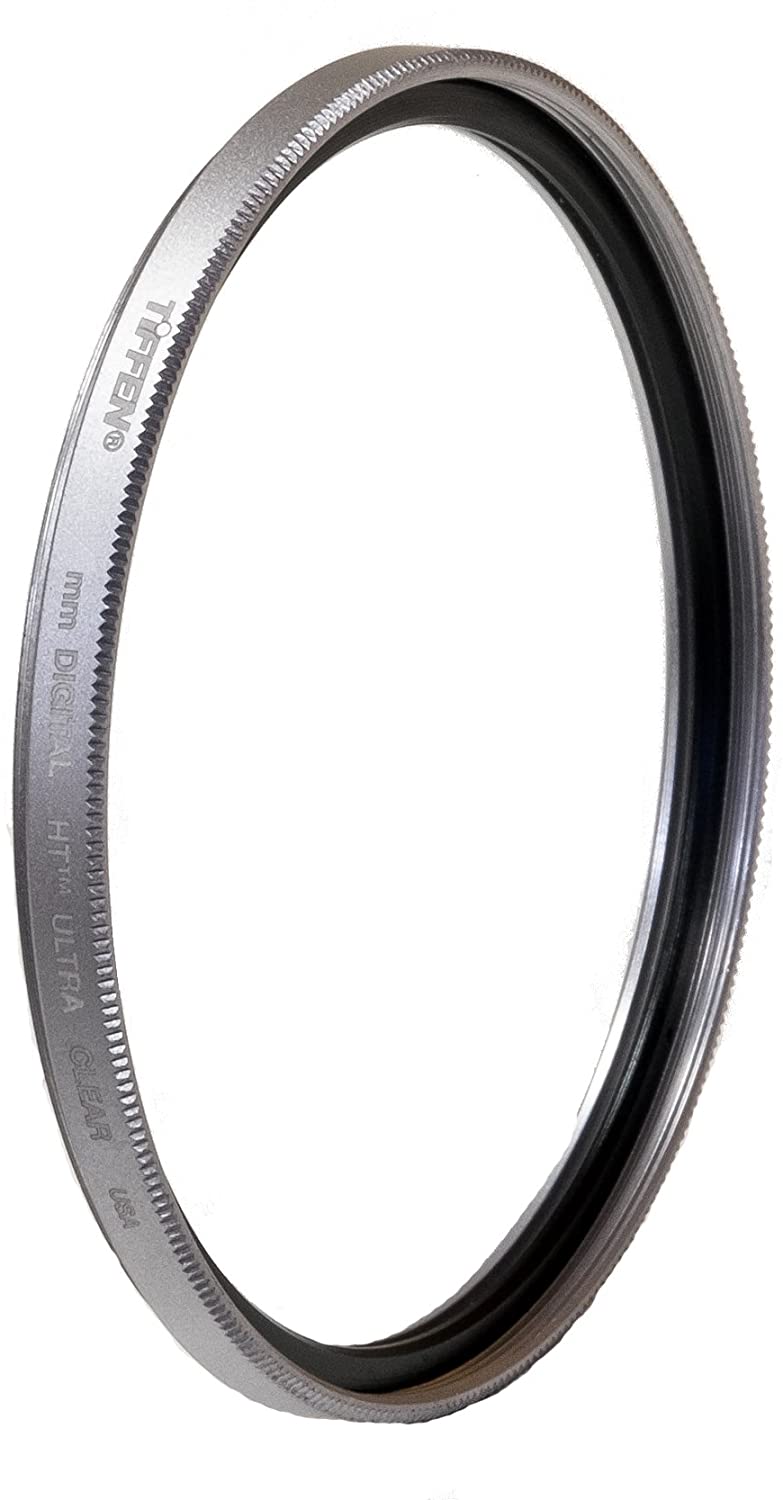
The Tiffen UV Protection Filter offers expert lens protection at one of the most affordable prices.
Find Price On Amazon
– Gobe UV Protection Filter (Editor's Choice)
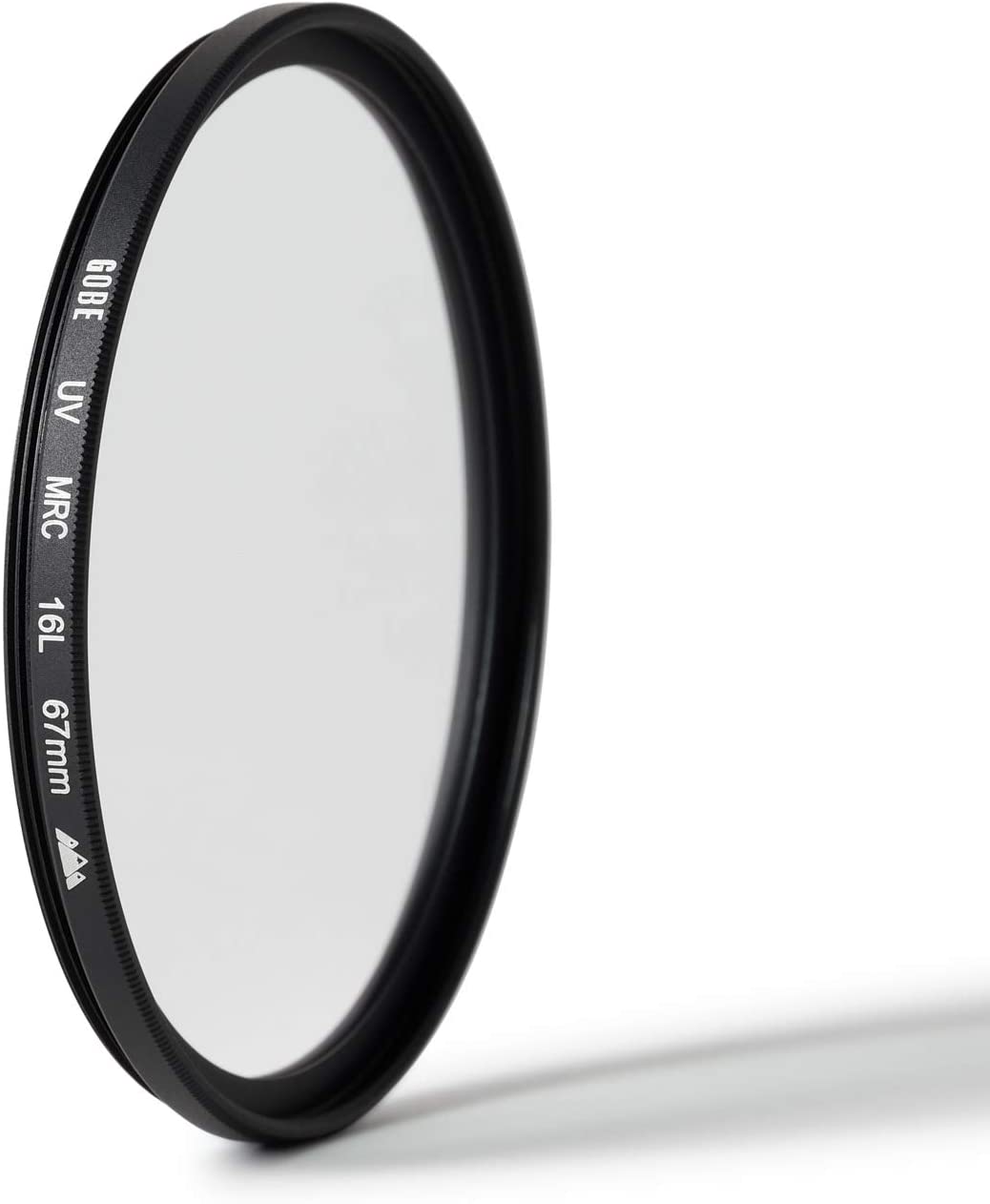
The Gobe UV Protection Filter sets itself apart with a sixteen-layer nano-coated filter for a fraction of the toll.
Detect Price On Amazon
– Hoya HD3 UV Filter (Highest Quality)

Labeled as the "toughest filter in the world", the Hoya HD3 offers the highest standard of quality.
Notice Cost On Amazon
x Best UV Filters For Photographers
1. B+W Nano Coated UV Protection Filter
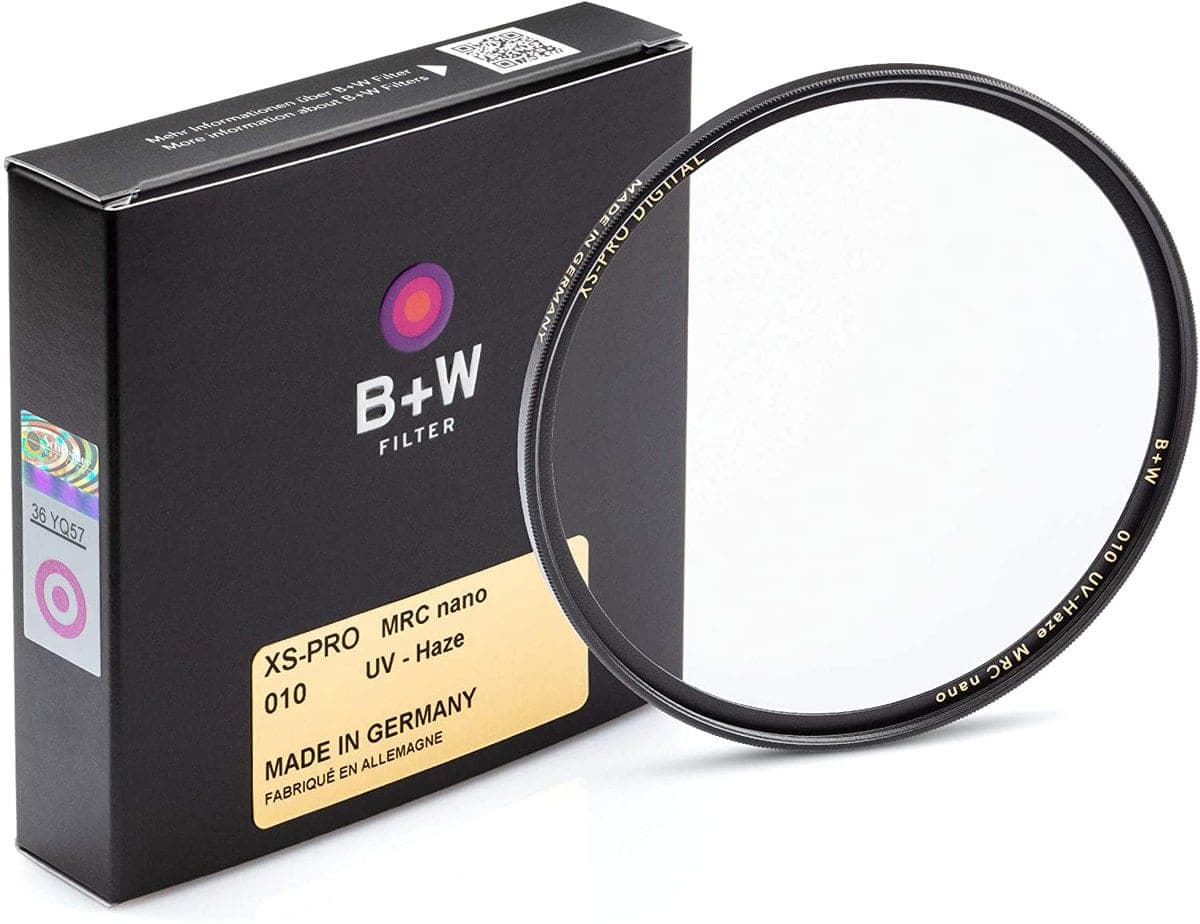
One of the summit filters in toll versus quality is the B+West Nano Coated UV Protection Filter. This UV filter has a nanocoating on both sides to aid with prototype quality and makes cleaning the filter easier. If you get dust or h2o on the lens, information technology volition easily bead off and not absorb similar in lower-end filters. Whether you're shooting with an entry-level or professional camera body, this filter will protect your camera lens and maintain the highest image quality.
- Coating Type: Nanocoating
Observe Price On Amazon
2. Hoya Pro1 Multi-Coated UV Filter
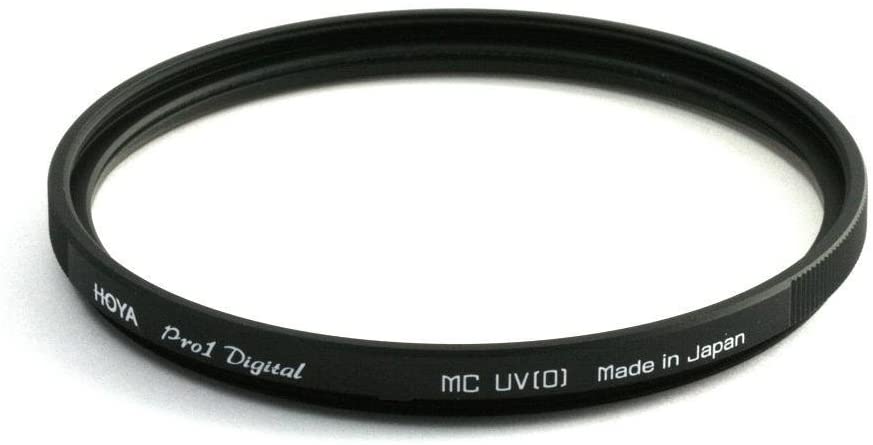
The Hoya Pro1 Multi-Coated UV Filter offers a loftier-quality filter at an extremely reasonable price. It protects from the usual UV rays and bluish light like other UV filters while also preventing ghosting with a multicoating end. It has a matte blackness lens ring to prevent extra reflections and a depression profile design to eliminate vignetting at wider focal lengths. If you desire a great UV filter to protect your camera lens only doesn't lapse in quality, this should be your choice.
- Coating Type: Multi-coated
Find Price On Amazon
iii. Lenskins Multi-Coated UV Filter
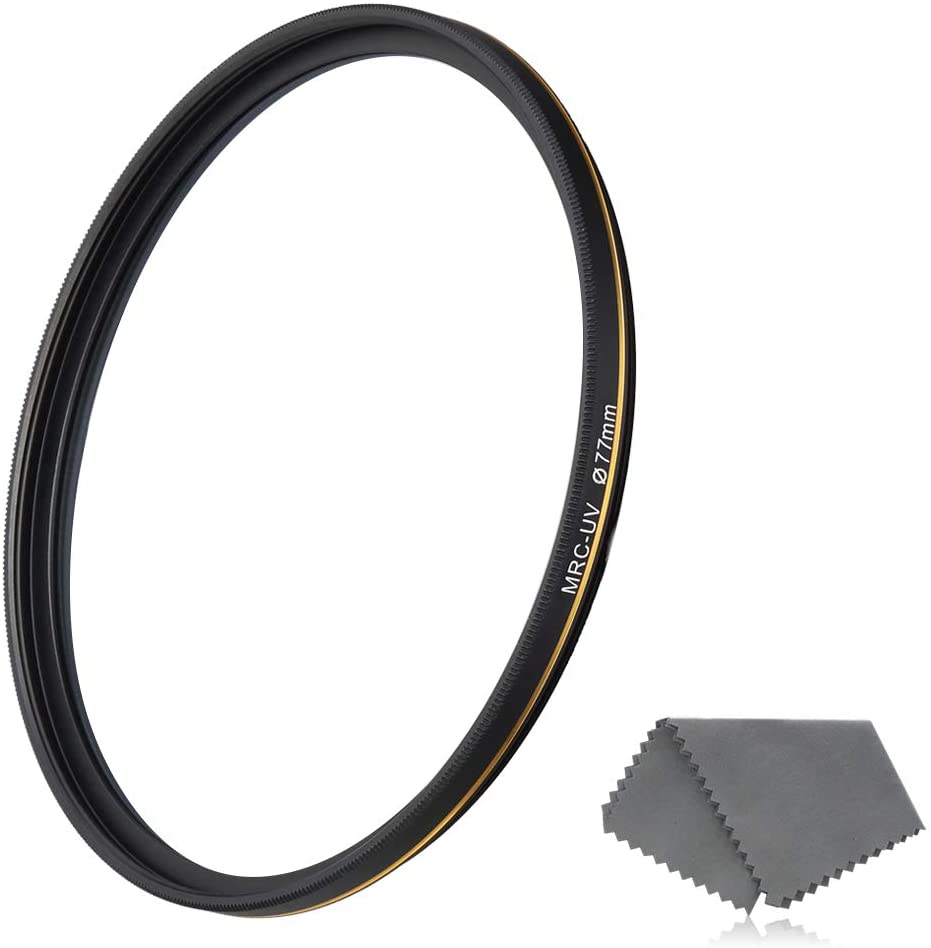
The Lenskins Multi-Coated UV Filter offers 16 layers of MRC coating to protect your lens from oil, dust, water, and more. With these dissimilar coating levels, it'south uncommonly easy to clean and makes it a perfect filter if you lot're often outdoors. Being multicoated, it does a skillful job of reducing ghosting and flaring in most lighting conditions. It has an ultra-slim blueprint, so information technology doesn't stick out much on your lens and comes with a lens cloth for easy filter intendance!
- Coating Blazon: Multi-coated
Find Price On Amazon
4. Tiffen Multi-Coated Digital UV Filter

The Tiffen Multi-Coated UV Filter is another solid option to protect your lens without whatsoever color shift or ghosting effects. Tiffen has long been an extremely reputable filter company in photography and pic, so you tin can guarantee a quality product from them. With a multi-coated finish, this UV filter finer cuts downwardly glare and maintains contrast in most lighting situations. This filter too boasts a hardened blanket for increased durability if you want some added protection for your camera lens!
- Coating Type: Multi-coated
Find Price On Amazon
5. Hoya HD3 UV Filter

The Hoya HD3 UV Filter was designed to meet any camera's needs up to 50MP in quality. Unless yous're shooting on an absolute meridian of the line camera, you lot'll be well under this quality threshold. The Hoya HD3 boasts an ultra-difficult nanocoating, so y'all become the best lens protection with nanocoating for meliorate contrast and less ghosting. In fact, Hoya calls this filter "the toughest filter on the planet." That's but how confident they are that they're hardened coating engineering science works better than any other UV filter on the market. With 32 layers of coating and a 99.7% light transmission rate, this filter is the highest quality, but virtually expensive on the list.
- Blanket Type: Nano-coating
Find Price On Amazon
half-dozen. Gobe UV Protection Filter

Gobe has always been a darkhorse in the world of lens filters, producing surprisingly high-quality products for extremely cheap. The Gobe UV Protection Filter has a superior nanocoating to create one of the highest quality UV filters y'all tin buy. It's made with premium SCHOTT B270 optical glass for perfect sharpness and clarity in every photo. With 16 layers of coating, this filter is tough and can be easily cleaned from grit or water on the lens. All-time of all, every buy of this filter will plant 5 trees in areas affected by deforestation. Now you can protect your camera lens while making the planet a ameliorate identify!
- Blanket Blazon: Nano-blanket
Discover Toll On Amazon
7. K&F Concept UV Filter With Slim Profile
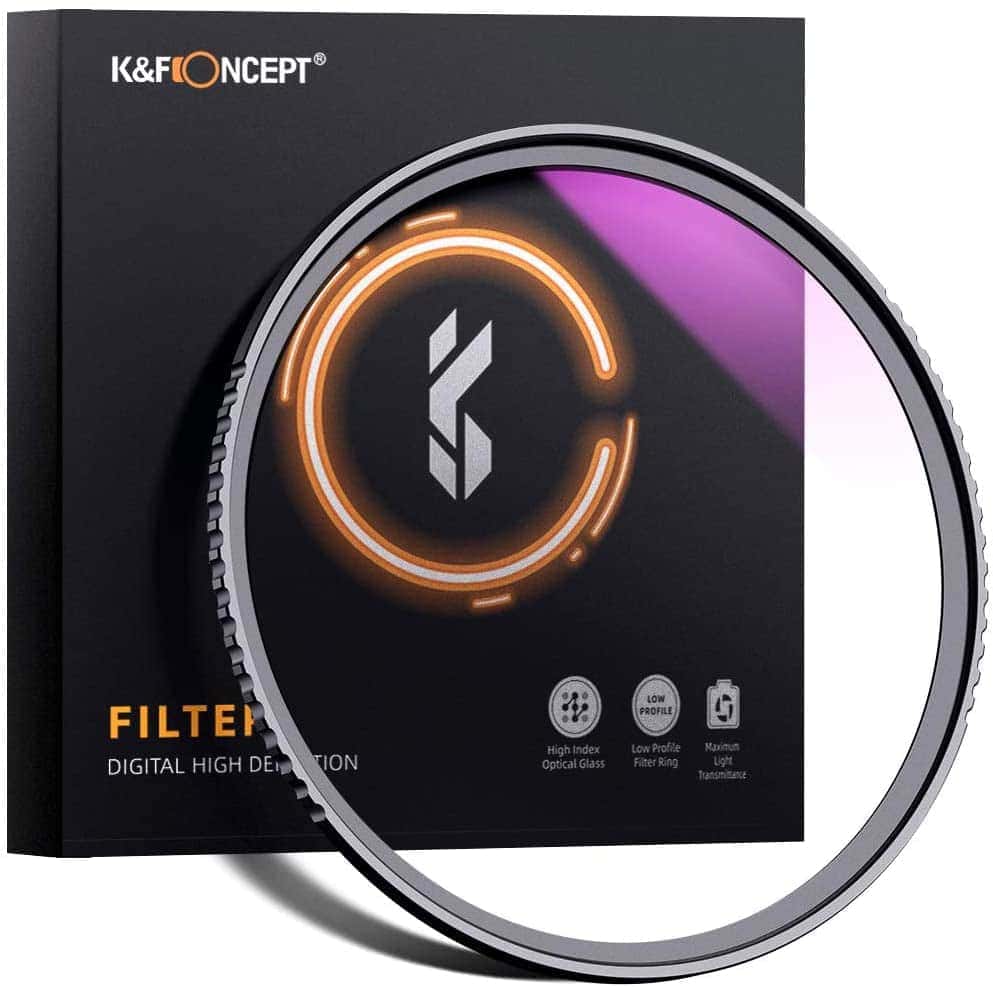
If you want a inexpensive, get the job done, UV filter, the G&F Concept UV Filter is a reasonable option. Unlike higher-end filters, this i doesn't take an impressive array of coatings on information technology. However, it does have a single anti-reflective coating to help improve light transmittance and contrast. Information technology has an ultra-slim blueprint, and so it doesn't stick out from your lens much, reducing vignetting at wider angles. If you want a filter merely to protect your camera lens, this is a perfect option for only a few dollars.
- Coating Type: Anti-Reflective
Find Price On Amazon
8. Waka UV Filter
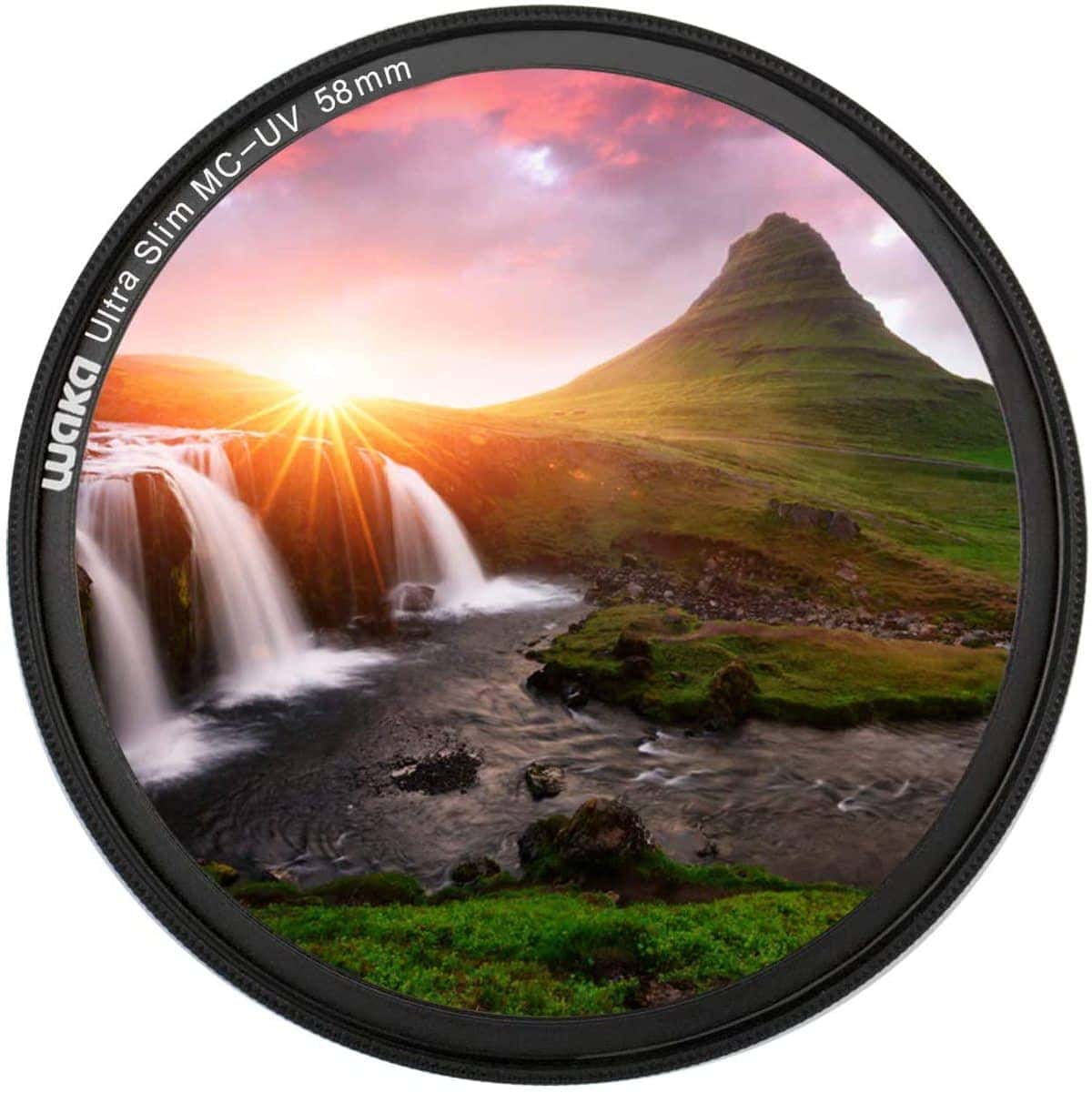
The Waka UV Filter is multi-coated with 16 layers of optical glass. With a solid corporeality of protective layers, this filter will be slightly tougher than other filters in this lower toll range. Besides protecting from ghosting and loss of dissimilarity, it also blocks all UV spectrum light that could touch on your images' quality on a film photographic camera. The huge bonus to Waka is that they offering a two year 100% satisfaction guarantee. Then if y'all decide the filter isn't good enough, you lot can send it dorsum without a worry. Considering the specs versus price on this UV filter, I don't retrieve you lot'll be upset with it!
- Coating Type: Multi-coated
Observe Price On Amazon
9. Tiffen UV Protection Filter
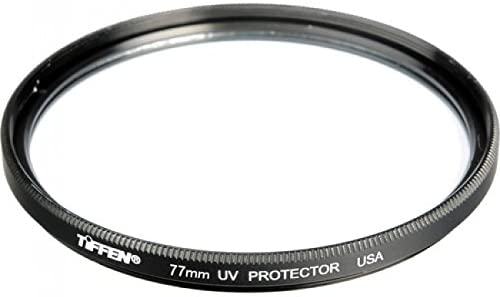
The Tiffen UV Protection Filter is one of the near popular lens protection filters online. Information technology has a corking build quality while however serving the sole purpose of protecting your photographic camera lens. The major downside to this filter is that it's not actually made of glass, but instead with plastic. In that sense, this filter isn't ideal for college-finish cameras but could get the task done for an entry-level camera trunk. If you need something solely to protect your photographic camera lens, this lens filter will get information technology done.
- Blanket Blazon: None
Find Price On Amazon
10. Amazon Basics UV Filter
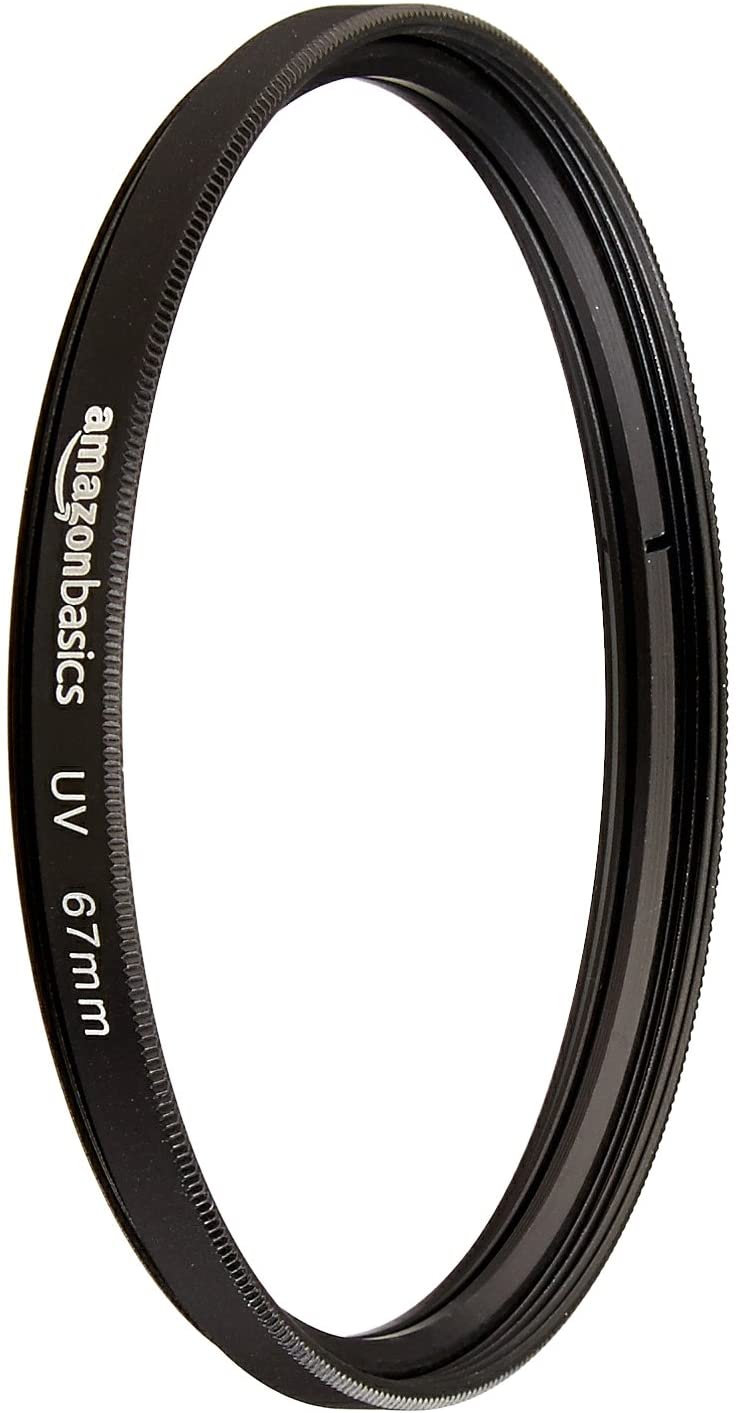
Lastly, the Amazon Basics UV Filter is the most toll-effective selection for protecting your photographic camera lens. This filter doesn't have much going for it in terms of special features or coating types. However, it will serve you well to protect your lens from any scratches or dust that comes its way. If yous just desire the most barebones and basic UV filter money tin can buy, this plastic filter is your all-time bet.
- Blanket Type: None
Detect Price On Amazon
Conclusion
Any photographic camera lens tin can be fairly protected using a UV filter. Although these filters won't stop a bullet, they do a great task protecting your lens from bumps and scratches. No matter what blazon of photography you do, a UV filter is something you should definitely consider. If y'all wait also long, you run the hazard of damaging your lens permanently. Wouldn't you rather harm a fiddling filter instead of your very expensive lens? To me, the reply seems articulate. Become yourself a UV filter for all your lenses and rest easy knowing your lenses are protected!
Besides using a filter, there are other ways you can keep your lens protected. To learn how, check out this article on how to protect your lens from damage.
Want more articles like this? Subscribe to my weekly newsletter for more photography, and photo editing tips delivered straight to your inbox!
– Brendan 🙂
What Are Filters In A Camera,
Source: https://www.bwillcreative.com/the-best-filter-to-protect-your-camera-lens/
Posted by: butlerqueent.blogspot.com


0 Response to "What Are Filters In A Camera"
Post a Comment